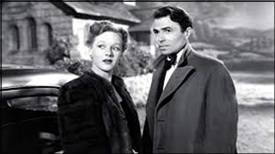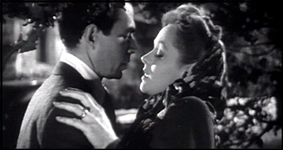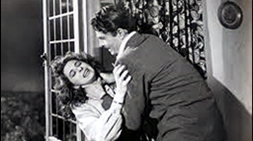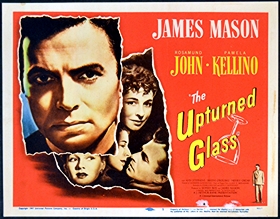Tue 30 Apr 2024
Movie Review: THE UPTURNED GLASS (1947).
Posted by Steve under Films: Drama/Romance , Reviews[4] Comments

THE UPTURNED GLASS. General Film Distributors, UK, 1947. Universal-International, US, 1947. James Mason, Rosamund John, Pamela Mason (as Pamela Kellino), Ann Stephens, Brefni O’Rorke. Screenplay: John Monaghan and Pamela Kellino, based on a story by the former. . Director: Lawrence Huntington. Currently streaming on the Criterion Channel as part of their “gothic noir” collection.
Dr. Michael Joyce, played quite earnestly and effectively by James Mason in one of his last few films he made in the UK, is not only a noted brain surgeon, but he often gives lectures at the university as an expert in criminology. It is in the latter role that the movie begins. The theme for his presentation is that murders can be done for rational reasons by people who are quite sane. To demonstrate the point, he tells the students of just such an instance.
It quickly becomes apparent to the viewers that the killer in the story he tells is himself, related almost entirely in flashback. It’s an unusual structure for telling a tale, narrating as he does how it all came about, with himself playing the primary character. After he saves a young girl from going blind, he finds himself falling in love with the child’s mother, whose husband’s job keeps him long distances from home for long periods of time.

Realizing the probable folly of their ways, they break off the affair. Soon thereafter, however, the woman in the case is found dead, having jumped to her death (possibly an accident) from a second floor window to a brick courtyard below. Joyce has another thought. Could she have been pushed? And could the pusher be the dead woman’s sister-in-law? And if so, should Joyce take matters into his own hands?
All of the above takes up perhaps the first two-thirds of the movie, which while academically interesting is also as slow as molasses on a chily day. But with thirty minutes to go, the story suddenly shifts, catching the unwary viewer by surprise (me), and the noir nature of tale clicks in.

It’s almost good enough to make the first hour or so worth the wait. I’m still thinking about that. If it hadn’t been James Mason in the part, twenty minutes would have more than enough time to start thinking about finding something else to do.
And in any case, the ending does make a good fit with the beginning. Go back and read the first paragraph of this review again.
Various reviewers on IMDb have tried to explain the title, with varying but probably futile success. The movie began its life as a story about the Bronte sisters, but when they decided it wasn’t working, they scrapped the whole thing and rewrote it from scratch, keeping only the title.

April 30th, 2024 at 6:25 pm
Wasn’t this one of Mason’s unexpected smash hits during his last few years in Britain? Seems to me I recall reading about a couple of boffo box-office pictures of his, really enhancing his rep, right before he departed. Standing him in very good stead through the early ’50s.
I knew someone who shed tears when they heard his death notices and I didn’t blame ’em a bit …whattaguy he was …
April 30th, 2024 at 8:31 pm
Here’s what Wikipedia has to say about the film’s box office receipts:
“According to trade papers, the film was a “notable box office attraction” at British cinemas in 1947.
“The film earned producer’s receipts of £156,000 in the UK and £85,800 overseas.
“It earned a reported profit of £45,800.”
Whether or not that translates to “boffo” returns needs more context than this, but it sounds quite satisfactory to me.
May 1st, 2024 at 6:25 am
I started UPTURNED GLASS too, and as you predicted, soon gave up on it. Now I think I might try it another give, thanks to this review.
May 4th, 2024 at 12:45 am
“The man women love to hate,” was how Mason was billed by this point.
I have to a agree this one is deliberate for the beginning, but it sets up the events of the film almost like a novel rather than a film, and Mason’s British films were usually aimed at a female audience more interested in story and often tragic romance rather than suspense per se. Obviously from its box office it hit that sweet spot.
I wonder if that title was in part a reference to the fatalistic ending of Omar Khayaam’s Rubiayt, you know, when you pass the poet’s grave, “turn up the glass.”